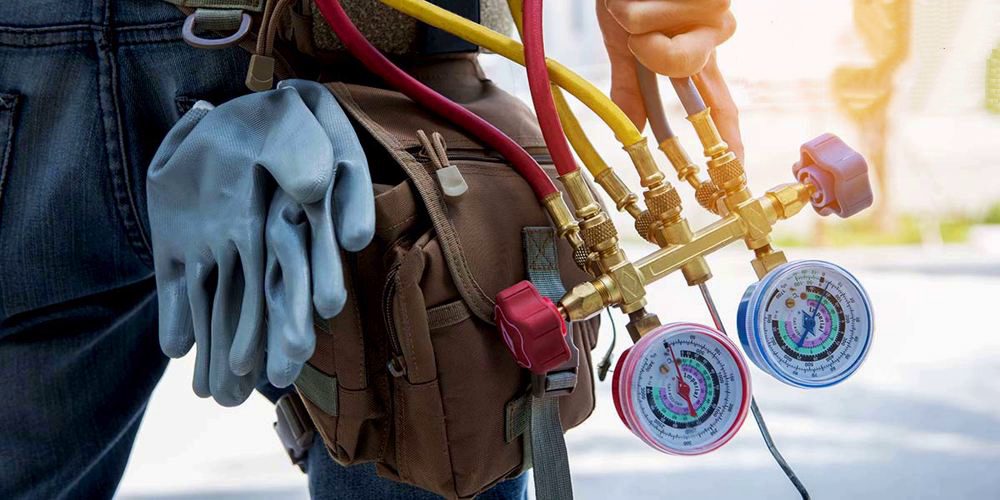Residential buildings require proper maintenance to ensure they operate efficiently and comfortably. Heating, ventilation, and air conditioning (HVAC) systems are essential for maintaining a comfortable living space, and regular maintenance is vital to keeping them functioning properly. Many homeowners neglect HVAC maintenance, but it is critical to ensure that the system runs at optimal performance levels, reducing energy costs and prolonging the life of the system. This article will discuss the top 5 benefits of regular HVAC maintenance for residential buildings.
Improved Energy Efficiency
One of the most significant benefits of regular HVAC maintenance is improved energy efficiency. HVAC systems consume a significant amount of energy, and when they are not functioning properly, they consume even more. A system that is not properly maintained can accumulate dust and dirt in its various components, causing it to work harder to maintain a comfortable temperature. This increased workload leads to higher energy consumption and higher electricity bills.

However, regular HVAC maintenance ensures that the system is clean, lubricated, and running efficiently, reducing energy consumption and costs. For example, a dirty air filter can restrict airflow, making the system work harder to push air through the ducts, increasing energy consumption. Regular filter changes ensure that the system is not working harder than it needs to be, improving energy efficiency.
In addition to lower energy costs, improved energy efficiency also has environmental benefits. When HVAC systems consume less energy, they produce fewer greenhouse gas emissions, reducing their environmental impact.
Increased Lifespan
Another benefit of regular HVAC maintenance is an increased lifespan of the system. HVAC systems are a significant investment, and homeowners want to ensure that they last as long as possible. A well-maintained HVAC system can last for up to 15 years, while a poorly maintained system may only last for 5 to 10 years. Regular maintenance helps prevent breakdowns and ensures that the system operates at optimal performance levels, reducing the need for repairs and extending the life of the system.
Regular maintenance includes tasks such as cleaning and lubricating the system, inspecting the various components, and checking for wear and tear. When these tasks are performed regularly, the HVAC system is less likely to suffer from breakdowns, which can cause costly repairs and shorten the lifespan of the system.
Improved Indoor Air Quality
Regular HVAC maintenance also helps improve indoor air quality. An HVAC system that is not properly maintained can accumulate dust, dirt, and other contaminants, which are then circulated throughout the home. This can cause respiratory problems, allergies, and other health issues. However, regular HVAC maintenance ensures that the system is clean, reducing the amount of dust and other contaminants in the air and improving indoor air quality.
Regular maintenance includes tasks such as cleaning the air ducts and replacing the air filters. Dirty air ducts and filters can harbor dust, mold, and other contaminants that are harmful to human health. By regularly cleaning and replacing these components, homeowners can improve indoor air quality and reduce the risk of respiratory problems.
Lower Repair Costs
Regular HVAC maintenance can also help lower repair costs. When a system is not properly maintained, small problems can turn into larger ones, resulting in expensive repairs. Moreover, understanding the factors that affect commercial HVAC costs can help homeowners make informed decisions when it comes to repairs and replacements. However, regular maintenance can help identify and fix small problems before they turn into larger ones, preventing costly repairs.
For example, a loose or worn-out belt can cause the blower motor to work harder, leading to premature wear and tear on the motor. Regular maintenance ensures that the belt is tightened or replaced as needed, preventing damage to the blower motor.
In addition to preventing costly repairs, regular maintenance can also help homeowners avoid emergency repair calls. HVAC systems are more likely to break down when they are not properly maintained, and emergency repair calls can be expensive. Regular maintenance ensures that the system is running smoothly, reducing the risk of breakdowns and emergency repair calls.
Peace of Mind
Finally, regular HVAC maintenance can provide homeowners with peace of mind. Knowing that the HVAC system is running efficiently and is less likely to break down can reduce stress and anxiety about unexpected repairs and expenses. Regular maintenance also helps homeowners identify potential issues before they become major problems, providing peace of mind and ensuring the system runs smoothly throughout the year.

Conclusion
Regular HVAC maintenance is essential for maintaining a comfortable living space in residential buildings. Some of the benefits of regular HVAC maintenance are improved energy efficiency, increased lifespan, improved indoor air quality, lower repair costs, and peace of mind. Neglecting HVAC maintenance can result in higher energy costs, costly repairs, and reduced indoor air quality, which can lead to health problems. By performing regular maintenance tasks such as cleaning and lubricating the system, inspecting the components, and replacing air filters, homeowners can ensure that their HVAC system operates at optimal performance levels, prolonging the life of the system and providing a comfortable living space for years to come.






